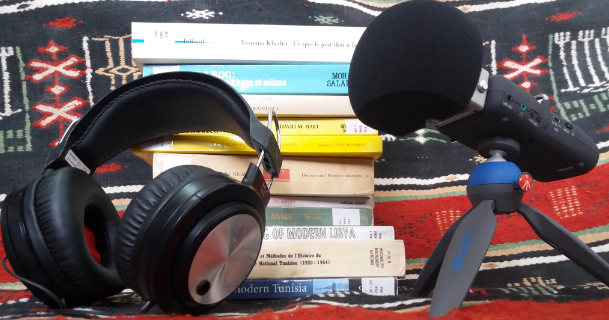
64.7K
Downloads
225
Episodes
Maghrib in Past & Present | Podcasts is a forum in which artists, writers, and scholars from North Africa, the United States, and beyond can present their ongoing and innovative research on and in the Maghrib. The podcasts are based on lectures, live performances, book talks, and interviews across the region. Aiming to project the scientific and cultural dynamism of research in and on North Africa into the classroom, we too hope to reach a wider audience across the globe.
Maghrib in Past & Present | Podcasts is a forum in which artists, writers, and scholars from North Africa, the United States, and beyond can present their ongoing and innovative research on and in the Maghrib. The podcasts are based on lectures, live performances, book talks, and interviews across the region. Aiming to project the scientific and cultural dynamism of research in and on North Africa into the classroom, we too hope to reach a wider audience across the globe.
Episodes
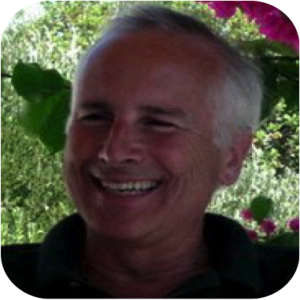
Thursday Feb 04, 2021
Populism and the Crisis of the Republic
Thursday Feb 04, 2021
Thursday Feb 04, 2021
Episode 106: Populism and the Crisis of the Republic
In this podcast, Professor Charles Tripp argues that populism is a form of collective politics that embodies distinct ideas, particularly those about popular sovereignty. Populism, he stresses, claims to communicate and respond directly to the political base – the people – by passing increasingly unpopular political elites and institutions. Three features characterize populism: (1) demagogic simplification; (2) anti-representative confrontation of below and above; and (3) assertion of a clear and uniform will of the people. The rise of populism is a symptom of a crisis of governance and particularly a crisis of the republic, which fails to fulfill its promises of citizen equality. From this perspective, populism becomes a technique for disguising deep inequalities of power.
Posted by: Hayet Lansari, Librarian, Outreach Coordinator, Content Curator (CEMA).
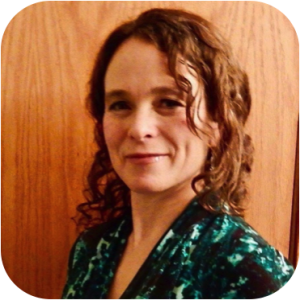
Thursday Jan 28, 2021
Thursday Jan 28, 2021
Episode 105: Jedba, Jinns, and Hāl: Bodily Modalities of Mental-Emotional Health and 'Musico-thérapie' in Algeria
In this podcast, Dr. Tamara Turner illustrates the inextricable relationship between mental-emotional health, sound, and consciousness through a spectrum of 'psychological' states that are locally mapped in Algeria as bodily modalities: jedba, hāl, and bori. These three bodily modalities constitute a wide and fluctuating spectrum of musically-cultivated, ritual trance dancing seen in various contexts from weddings and festivals to 'Sufi' hadrat, particularly among the Dīwān of Sīdī Bilāl tarīqa. Drawing from in-depth ethnographic fieldwork on Morocco and Algeria, Dr. Turner shows how notions of 'music' exceed social, symbolic, and aesthetic valence because sound and music are thought about medicinally as vibrating agents in ongoing health maintenance.
A cultural anthropologist, Dr. Tamara Turner is a researcher at the Center for the History of Emotions at the Max Planck Institute for Human Development in Berlin. Her research is at the intersection of psychological anthropology, musical and performance practice, and affect studies. She specializes in North African Sufism, anthropology of religion and medicine, and the links between cultural notions of affect, consciousness, and mental-emotional health. Her doctoral thesis was the first research to thoroughly document the musical repertoire, practice, and history of Algerian dīwān, a nocturnal trance ritual of the Bilaliyya Sufi Order that emerged out of the trans-Saharan slave trade. As a musician as well as a scholar, she studied with ritual musicians and experts, attending and documenting dīwān rituals across Algeria from the Mediterranean coast to the Saharan Desert. Analytically, Dr. Turner's work investigates the critical role of emotions and affects in rituals in general, particularly as they pertain to varieties of altered states of 'consciousness,' social and trans-personal pain and suffering, and memory. In 2017, her doctoral thesis won an Elsevier Outstanding Thesis prize. Her research in Algeria and Morocco has previously been funded by various grants from King's College London, the British Forum for Ethnomusicology, the Centre d'Études Maghrébines en Algérie, and the West African Research Association.
This episode is part of “Health and Humanities in the Maghrib” a lecture series by the American Institute for Maghrib Studies (AIMS), organized by the Centre d'Études Maghrébines à Tunis (CEMAT) and the Centre d'Études Maghrébines en Algérie (CEMA), in close collaboration with the Tangier American Legation Institute for Moroccan Studies (TALIM). It was recorded on the 1st of October 2020 between Berlin, Oran, and Tunis. Dr. Robert P. Parks, CEMA Director, moderated the lecture and debate.
To see related slides please visit our web site: www.themaghribpodcast.com
We thank Dr. Tamara Turner, Ethnomusicologist and Research Fellow at the Max Planck Institute for Human Development, Center for the History of Emotions, for her interpretation of Sidna Ali, from the diwan repertoir.
Realization and editing: Hayet Lansari, Librarian, Outreach Coordinator, Content Curator (CEMA).
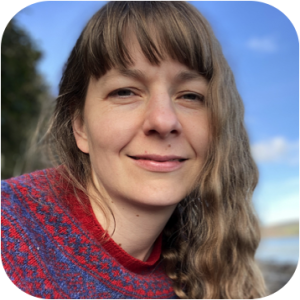
Wednesday Jan 20, 2021
Wednesday Jan 20, 2021
Episode 104: Of Jinn Theory and Germ Theory: Translating Bacteriological Medicine and Islamic Law in Algeria
In this podcast, focusing on colonial Algeria c. 1890 to 1940, Dr. Hannah-Louise Clark explores how Muslim intellectuals and ordinary people learned about microbes and responded to bacteriological medicine. Many Algerians feared invisible spirits (jinn) and sought the healing powers of saints and exorcists. Was it then permitted to use French treatments and follow rules of Pasteurian hygiene? Specialists in Islamic law, other intellectuals, and unlettered villagers showed a persistent concern with these and other questions in the wake of colonial conquest and violence, as novel techniques, therapeutics, and forms of epistemic authority were introduced, and new visions of religious orthodoxy and national revival were formulated. Examining material culture and writings across a range of genres and formats, Dr. Clark argues that Islamic tradition and law were integral to the emerging science and culture of microbes in 20th-century Algeria. While Islamic reformists sought to displace jinn theories, other Algerian intellectuals and colonial officials found it convenient to explain germs in terms of jinn. Both French and Muslim elites combined religious principles and hygiene to advance their competing projects of political and social control targeted at the Muslim family, thereby attempting to displace women’s jinn-based practices.
Dr Hannah-Louise Clark is lecturer in global economic and social history at the University of Glasgow. Her work investigates cross-cultural translations of knowledge and professional hierarchies, technology transfer, state governance, and epidemics in North Africa, c. 1800-present, with a current focus on Algeria. Clark pays particular attention to neglected archives and Arabic-language sources to document and analyse long-term local, regional, and trans-regional trends in health and social welfare. Her research has informed teaching on history of medicine within Algeria’s medical curriculum, and has been recognized and supported by awards and grants from the National Endowment of the Humanities “Constructing African Medical Heritage: Legacies of Empire and the Geopolitics of Culture, 1890–1990,” with Helen Tilley [PI] and Michael Afolayan, 2020-2023), The Leverhulme Trust, Princeton University Committee on Academic Programmes for Alumni, and the US Department of Education DDRA Fellowship and others. Clark also collaborated with cultural heritage professionals and students at the University of Glasgow to develop “global history hackathons” as a format for research incubation and teaching with archives and museum collections. She is currently working on a book manuscript on race, religion, and the Pasteurian public health worldview in early 20th-century Algeria.
This episode is part of “Health and Humanities in the Maghrib,” a lecture series by the American Institute for Maghrib Studies (AIMS), organized by the Centre d'Études Maghrébines à Tunis (CEMAT) and the Centre d'Études Maghrébines en Algérie (CEMA), in close collaboration with the Tangier American Legation Institute for Moroccan Studies (TALIM). It was recorded on the 26th of October 2020 between Glasgow, Oran, Oxford, and Tunis. James McDougall, Professor of History at St. Anthony's College, University of Oxford, moderated the lecture and debate.
To see related slides, visit our web site: www.themaghribpodcast.org
We thank our friend Ignacio Villalón for his guitar performance for the introduction and conclusion of this podcast.
Realization and editing: Hayet Lansari, Librarian, Outreach Coordinator, Content Curator (CEMA).
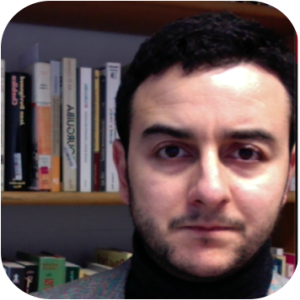
Wednesday Jan 13, 2021
On Memory, Remembering, and Mourning in the Maghrib Since the Tunisian Revolution
Wednesday Jan 13, 2021
Wednesday Jan 13, 2021
Episode 103: On Memory, Remembering, and Mourning in the Maghrib Since the Tunisian Revolution
In this podcast, Dr.Idriss Jebari contemplates the outpouring of memory from the former leftists of the Perspectives movement, following the 2011 Tunisian Revolution. In a series of published memoirs, the likes of Gilbert Naccache, Fethi Ben Haj Yahia and others take their readers from their experience of prison in the sixties and seventies, as well as their reflections on critical moments of Tunisia's political transition, particularly transitional justice and national reconciliation. Through these memoirs, Dr. Jebari explores how they could help write new histories for the Tunisian people: one that is plural and democratic. On the ten-year anniversary of the Revolution, after unprecedented transformations and the global pandemic, we are reminded of the fleeting nature of memory in light of the tragic passing of several figures from the Maghrib's past.
Dr. Idriss Jebari is Al Maktoum Assistant Professor in Middle East Studies at Trinity CollegeDublin. His work investigates the distinctiveness of the Maghribi critique of modernity in contemporary Arab intellectual and cultural history. He completed a doctorate on the history of the production of critical thought in Morocco and Tunisia at the University of Oxford on the intellectual projects of Moroccan thinker Abdallah Laroui and Tunisian thinker Hichem Djaït. He then held an Arab Council for Social Sciences postdoctoral fellowship at the American University of Beirut to study the dynamics of intellectual and cultural exchanges between the Maghrib and the Mashriq after 1967. He has published on the intellectual projects of several North African intellectual figures such as Abdelkebir Khatibi, Mohamed Abed al-Jabri and Malek Bennabi, and how the younger generations remember this intellectual heritage and the Arab Left. He is currently working on his first book manuscript that will address the critical societal debates that shaped North Africa's path today modernity in the sixties and seventies.
This podcast was recorded between Tunis and Dublin on January 8, 2021, by the Centre d'Études Maghrébines à Tunis (CEMAT) and the Centre d'Études Maghrébines en Algérie (CEMA) and is part of the special podcast series, "The Ten-Year Anniversary of Tunisia's Revolution (January 14, 2021)." The podcast was introduced by Dr. Robert P. Parks, CEMA Director.
We thank Yesser Jradi for his interpretation of "Narja3lk dima." A talented artist, Yesser is a painter, musician with interests in cinema and theatre.
Posted by Hayet Lansari, Librarian, Outreach Coordinator, Content Curator (CEMA).
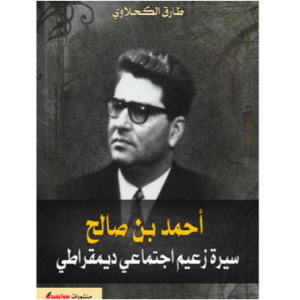
Wednesday Jan 13, 2021
Wednesday Jan 13, 2021
Episode 102: Conversation with Lisa Anderson and Tarek Kahlaoui: Reflections on Tunisia's State Building History and Contemporary Democratization Experience
In this discussion, Lisa Anderson and Tarek Kahlaoui reflect on Tunisia's post-independence state-building history and the country's contemporary democratization experience. The conversation draws listeners to the transformative moments that preceded the 2011 Revolution, which had subsequent pivotal effects. Reflecting on their own intellectual and professional engagement with Tunisia, the speakers underscore the shortcomings of minimalist and purely institutional academic approaches to the study and practice of democracy.
Prof. Anderson is the James T. Shotwell Professor Emirita of International Relations at Columbia University, former President of the American University in Cairo, the Dean Emerita of the School of International and Public Affairs at Columbia University, and author of The State and Social Transformation in Tunisia and Libya: 1830-1980 (Princeton University Press, 1986).
Associate Prof. Kahlaoui taught history and Islamic civilization at Rutgers University for a decade after completing his Ph.D. at the University of Pennsylvania in 2008. After serving as the general director of the Tunisian Institute of Strategic Studies, Tunisia's leading think tank tied to the Presidency of the Republic, he resumed teaching history of the Arab World at the South Mediterranean University in Tunis. He is author of a 2020 book on Ahmed Ben Salah, a powerful super-minister under Tunisia's first president, Habib Bourguiba.
This podcast recorded on January 6, 2021 between Tunis and New York, as a part of CEMA and CEMAT's "The Ten-Year Anniversary of Tunisia's Revolution (January 14, 2011)" lecture series. Organized by the Tunis Officeof Columbia Global Centers (CGC) with the Centre d'Études Maghrébines à Tunis (CEMAT) and the Centre d'Études Maghrébines en Algérie (CEMA), this podcast was moderated by Dr. Laryssa Chomiak, CEMAT Director, and introduced by Youssef Cherif, CGC Director.
We thank Yesser Jradi for his interpretation of "Narja3lk dima." A talented artist, Yesser is a painter, musician with interests in cinema and theatre.
Posted by Hayet Lansari, Librarian, Outreach Coordinator, Content Curator (CEMA).

Wednesday Jan 13, 2021
"Willis from Tunis, 10 ans et toujours vivant!" - Entretien avec Nadia Khiari
Wednesday Jan 13, 2021
Wednesday Jan 13, 2021
Episode 101: "Willis from Tunis, 10 ans et toujours vivant!" - Entretien avec Nadia Khiari
Le chat Willis from Tunis est né jeudi le 13 janvier 2011 au moment où le président tunisien déchu, Ben Ali, prononçait un discours dans lequel il promettait, entre autres, la liberté d'expression. Cette chronique graphique était pour l'auteur un moyen de partager avec son entourage direct via les réseaux sociaux, son ressenti vis-à-vis de la situation politique que la Tunisie vivait. Sur un ton satirique, le matou commentait l'actualité politique au jour le jour et n'a pas cessé depuis.
Dans ce podcast, Dr. Meriem Guetat, Directrice-adjointe du Centre d'Études Maghrébines à Tunis (CEMAT), s’entretient avec Nadia Khiari sur son nouveau livre de dessins Willis from Tunis, 10 ans et toujours vivant !, paru récemment aux Éditions Elyzad. La conversation relate l'engagement de Nadia Khiari pour la liberté d'expression et les droits humains, la portée de son œuvre caricaturale et artistique ainsi que les développements du personnage Willis, ponctués par la révolution elle-même.
Nadia Khiari, enseignante en arts plastiques, peintre et dessinatrice, a publié plusieurs recueils de chroniques sur la révolution tunisienne. Elle publie ses dessins dans Siné Mensuel, Courrier International et est membre de Cartooning for Peace. Elle a reçu le Prix Honoré Daumier (2012), les insignes de Docteur Honoris Causa de l'Université de Liège (2013), le prix international de la satire politique (2014), le prix Couilles au cul (2016) ainsi que le Prix Sokol (2018).
Ce podcast a été enregistré le 5 janvier 2021 par le Centre d'Études Maghrébines à Tunis (CEMAT) dans le cadre de la série "Ten-Year Anniversary of Tunisia's Revolution (January 14, 2021)."
Nous remercions Yesser Jradi pour son interprétation de "Narja3lk dima.". Un artiste talentueux, Yesser est peintre et musicien, il s’intéresse aussi au cinéma et au théâtre.
Posté par: Hayet Lansari, Bibliothécaire / Chargée de la diffusion des activités scientifiques (CEMA).

Thursday Jan 07, 2021
Thursday Jan 07, 2021
Episode 100: Constitution-making Processes during Democratization: Egypt and Tunisia after the 2010/11 Uprisings
In this podcast, Dr. Tereza Jermanová, discusses the differences in the constitution-making processes and design in Tunisia and Egypt during their transitions. Dr. Jermanová looks at how constitution-making procedures are perceived as, on the one hand, constraints –that might restrict the ability of majority actors to debate and set the rules for how a constitution will be made; and on the other hand, as a space where regular social interactions between individuals coming from different political backgrounds can help them to shed some of the prejudices that they have of their opponents and to build interpersonal ties.
Dr. Jermanová argues that the inclusive procedures enabled constitutional agreement to become a possibility in Tunisia, while the lack of inclusion in Egypt made such an outcome improbable. Both countries set off on different tracks towards – and away from – democracy not because they followed different constitution-making designs, but because of factors that shaped their adoption in the first place.
Dr. Tereza Jermanová is an Assistant Professor at the Department of Middle Eastern Studies at the Faculty of Arts, Charles University in Prague where she lectures on Contemporary politics of the Middle East and North Africa. She earned her Ph.D. in Comparative Politics at the University of Warwick, Great Britain. She holds her MA in North African Politics from the University of Exeter, and before that studied politics at the Sciences Po in Paris and the Charles University in Prague. Her research focuses on Egypt, Tunisia, and processes of democratization and constitution-making.
This interview was led by CEMAT Associate Director, Dr. Meriem Guetat, and was recorded on February 7, 2020, at the Centre d'Études Maghrébines à Tunis (CEMAT), as part of the Conversations in Law and Society Series.
Posted by Hayet Lansari, Librarian, Outreach Coordinator, Content Curator (CEMA).
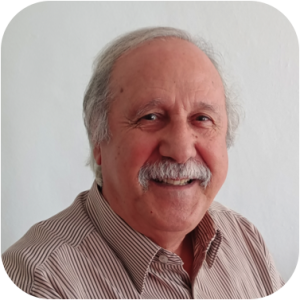
Thursday Nov 12, 2020
Oran, The Plague and COVID 19
Thursday Nov 12, 2020
Thursday Nov 12, 2020
Episode 99: Oran, The Plague and COVID 19
The French critical tradition has seen in Camus’ La peste (1947) an allegorical representation of German occupation, during the Second World War. He staged it in Oran, a coastal town in French Algeria, at the time, closed to the rest of the world because of a plague pandemic. The recent COVID-19 pandemic that flared up through the world sparked off reminiscences of the novel, which remains a master piece of French literature because of its most realistic description of social angst, which recalls paranoiac collective crisis, throwing crowds into panics, from the Middle Ages. Using two literary devices ‘Le pacte autobiographique’ (P. Lejeune) and the ‘Chronotope’ (M. Bakhtin) we propose another reading of this novel, away from the over trodden paths of studies of its human gallery of portraits, as institutionalized by a North/South (French) approach, which we consider as aesthetically valuable as legitimate for its cultural context.
We proceed through a South/North (Algerian) approach, based on two main protagonists ‘Oran’ and ‘the plague’ as characters by reference to another allegorical representation by ‘preterition’ (present in absentia) of a missing human entity, the Algerian people. While Camus stigmatizes the terrible suffering of the French people under the clamps of the German invader, he excludes the indigenous ‘Arab community’ from the setting of La peste, keeping silent on the painful ordeal of the Algerian people, under the clamps of 132 years of colonization. Camus’ ambivalent posture induced very controversial debates over the ‘genuineness’ of his commitment to the Algerian cause. Yet, today, Camus has become more than a symbolic trade mark that two different cultural-makings of history dispute, whereas he has always dedicated his life and writings to the whole of mankind.
Professor Sidi Mohamed Lakhdar Barka has been teaching ‘African non-native English and French writers’ literatures and African/American literatures of the first half of the twentieth century’, at the Department of English, Faculty of Foreign Languages, Mohamed Ben Ahmed University of Oran 2, since 1972. He produced several articles applying discourse analysis theories in the didactics of teaching literature to students coming from an oral tradition background, in Algeria. His pedagogical experience brought him to question the paradoxes of transmission of cultures through languages with a literary tradition (Arabic, French and English) to Algerian learners whose oral cultures have always been conveyed by local linguistic varieties of spoken Tamazight and Arabic, excluded from their literary syllabi.
This episode is part of “Arts and Letters in the Maghrib” lecture series and was recorded on the 26th of October 2020 at the Centre d'Études Maghrébines en Algérie (CEMA)
We thank our friend Ignacio Villalón, Master candidate at EHESS, for his guitar performance for the introduction and conclusion of this podcast.
Realization and editing: Hayet Lansari, Librarian, Outreach Coordinator, Content Curator (CEMA).
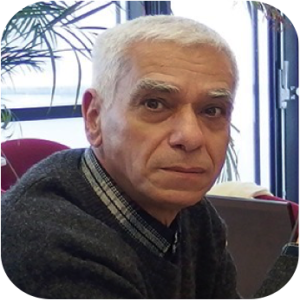
Monday Nov 09, 2020
En hommage à feu Pr. Abdelkader Lakjaa
Monday Nov 09, 2020
Monday Nov 09, 2020
Episode 98: En hommage à feu Pr. Abdelkader Lakjaa
La méthode n'enfante pas d'idées par elle-même
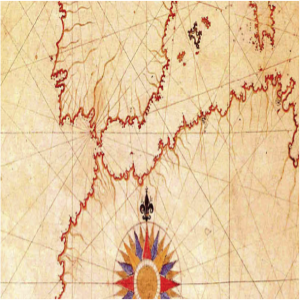
Wednesday Jul 22, 2020
Wednesday Jul 22, 2020
Episode 97: Maghrébins en Méditerranée:
Complicités corsaires maghrébines à l'époque moderne entre Méditerranée et Atlantique
La journée d’étude « Maghrébins en Méditerranée » s’inscrit dans le prolongement du workshop « La Méditerranée vue d’Afrique du Nord » organisé par l’Institut Américain d’Études Maghrébines en juillet 2019 à Tunis. Cette journée d’études, coordonnée par Pr. Fatima Zohra Guechi, se penche sur la présence et les rôles des Maghrébins en Méditerranée entre le 16ème et 19ème siècles. La course et la piraterie figurent parmi les faits historiques ayant marqué cette période. Les Chrétiens les associent à une guerre sainte, les musulmans au jihad.
Les communications présentées dans le cadre de cette journée examinent dans un premier temps les enjeux économiques et diplomatiques de la course en mettant l’accent sur les complicités corsaires maghrébines entre la Méditerranée et l’Atlantique, et les parcours familiaux des commerçants évoluant entre Alger, Livourne et Marseille.
Elles interrogent dans un second temps les circuits d’échange et les trajectoires des corsaires et négociants méditerranéens en interrogeant le cas de la course maritime de la Régence d’Alger entre l’Europe et la Sublime porte.
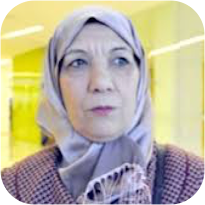 فاطمة الزهراء قشي، أستاذة التاريخ الحديث والمعاصر، جامعة عبد الحميد مهري قسنيطنة 2 ,مديرة مخبر تاريخ تراث ومجتمع 2012-2018 (سابقا), عضو في المجالس العلمية للكلية ( سابقا), رئيسة فريق التكوين لماستر ودكتوراه "المغرب الحديث: تاريخ وحضارة" (2011- 2018), رئيسة تحرير مجلة العلوم الإنسانية والاجتماعية- جامعة عبد الحميد مهري- قسنطينة 2 ,عضو محكم في مجلة إنسانيات ومجلة أسطور، وغيرهما.
فاطمة الزهراء قشي، أستاذة التاريخ الحديث والمعاصر، جامعة عبد الحميد مهري قسنيطنة 2 ,مديرة مخبر تاريخ تراث ومجتمع 2012-2018 (سابقا), عضو في المجالس العلمية للكلية ( سابقا), رئيسة فريق التكوين لماستر ودكتوراه "المغرب الحديث: تاريخ وحضارة" (2011- 2018), رئيسة تحرير مجلة العلوم الإنسانية والاجتماعية- جامعة عبد الحميد مهري- قسنطينة 2 ,عضو محكم في مجلة إنسانيات ومجلة أسطور، وغيرهما.
من بين منشوراتها:
- المؤسسات والحراك الاجتماعي والسياسي في الجزائر و تونس (18 و19م)، كتاب جماعي تحت إشراف فاطمة الزهراء قشي، منشورات مخبر تاريخ، تراث ومجتمع- دار بهاء الدين للنشر والتوزيع، قسنطينة، 2018.
- " السلطة العثمانية و الزعامات القبلية والحضرية في إيالة الجزائر (16 -19م) "، العرب: من مرج دابق إلى سايكس- بيكو(1516- 1916)- تحولات بنى السلطة والمجتمع: من الكيانات والإمارات السلطانية إلى الكيانات الوطنية،المركز العربي لأبحاث ودراسة السياسات، بيروت، 2019، صص. ؟
- 2013. La presse algérienne de langue arabe 1946-1954, enjeux politiques et jeux de plumes. (2d édition), Midad University Press.
- (dir). 2004. Constantine, une ville, des héritages. Constantine : Media-Plus. 2e édition en 2010.
- Compte rendu de l’ouvrage de Gilbert Meynier : L’Algérie et la France, Deux siècles d’histoire croisée, (iReMMO, L’Harmattan. 2017. Khalfoune, T. (Dir.), 2019. Mélanges en l’honneur de l’historien Gilbert Meynier. Paris :L’Harmattan, 2019, pp. 47-63.
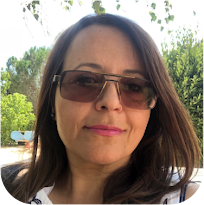 Dans ce podcast, Leila Maziane professeure d’histoire moderne à l’Université Hassan II Casablanca et membre du Réseau International de « La Gouvernance des Ports Atlantiques (XIVe XXIe siècles) » présente une communication portant sur les complicités corsaires maghrébines à l’époque moderne entre Méditerranée et Atlantique.
Dans ce podcast, Leila Maziane professeure d’histoire moderne à l’Université Hassan II Casablanca et membre du Réseau International de « La Gouvernance des Ports Atlantiques (XIVe XXIe siècles) » présente une communication portant sur les complicités corsaires maghrébines à l’époque moderne entre Méditerranée et Atlantique.
A cette époque, Salé et Tétouan deviennent les ports corsaires les plus importants du littoral marocain et les plus florissants du Maghreb. Leurs corsaires sont partout et rabattent vers leurs ports d’attache captifs et marchandises. Leur réussite s'explique en partie par une entente de grande envergure qui s’est tissée entre les corsaires du Maghreb, ceux de Tunis, Tripoli et surtout d’Alger qui se sont alliés avec zèle depuis le XVIe siècle à l'entreprise corsaire marocaine.
Elle a donc tenté de comprendre comment ces différentes places portuaires maghrébines ont su tirer le meilleur profit de la densité de leur réseau et de leur connexion pour devenir des foyers corsaires prospères du Maghreb à l'époque moderne. Et ce, malgré la contrainte des expéditions navales punitives des puissances européennes et des accords diplomatiques signés avec elles.
Leïla Maziane vient de publier l’Oriental et la Méditerranée, au-delà des frontières, Casablanca, Croisée des Chemins, 2019. Outre l’histoire et le patrimoine maritime et portuaire, ses thèmes de recherche sont les mobilités. Récemment, elle a coordonné avec Khalid Bensrhir, le dernier numéro de la Revue Hespéris-Tamuda, dédié à la Mobilité individuelle et collective en Méditerranée et en Méditerranée Atlantique : bilan et perspectives, LIII, 3, 2018. Elle a participé à plusieurs ouvrages collectifs tel que Cautivas y esclavas: el tráfico humano en el Mediterráneo, Granada, Editorial Universidad de Granada, 2016 ; La Gobernanza de los Puertos Atlánticos. Siglos XIV-XX, Madrid, Collection de la Casa de Velázquez, n°. 155, 2016.
Pour consulter les diaporamas associés à ce podcast, veuillez visiter notre site web: www.themaghribpodcast.com
Podcasts similaires:
La Méditerranée aux yeux des géographes maghrébins au Moyen Âge
Nous remercions notre ami Mohammed Boukhoudmi pour son interpretation de l'extrait de nouba, "Dziriya," par Dr. Noureddine Saoudi pour l'introduction et la conclusion de ce podcast.
Réalisation et montage: Hayet Lansari, Bibliothécaire / Chargée de la diffusion des activités scientifiques (CEMA).
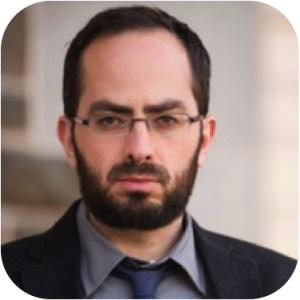
Wednesday Jul 15, 2020
Conflict in the Middle East and North Africa
Wednesday Jul 15, 2020
Wednesday Jul 15, 2020
Episode 96: Conflict in the Middle East and North Africa
In this podcast, Professor Jacob Mundy examines the historical and geographical definition and categorization of the MENA region through the discourse of the “everywhere war”, questioning the middle east as a permanent structure of conflict. In nowhere else in the world, war-particularly foreign intervention-is as prevalent and constant as in the MENA region. Professor Mundy argues that the creation of the MENA region as an identity component can be considered as a form of “violence”. He also traces the oil-security nexus, particularly the instability that it engenders across cases and time.
Jacob Mundy is an Associate Professor at Colgate University in the Peace and Conflict Studies Program. He is the author of Imaginative Geographies of Algerian Violence: Conflict Science, Conflict Management, Antipolitics (Stanford University Press, 2015) and more recently Libya (Polity Press, 2018). During the 2018-19 academic year, Professor Mundy was a Fulbright Scholar with the Université de Tunis and a research affiliate with CEMAT. He has also twice served on the board of the American Institute for Maghrib Studies, and is also on the editorial committee of Middle East Report. His current research examines the political economy of Libya’s transition after 2011.
This episode is part of the Contemporary Thought series and was recorded on September 12, 2019, at the Centre d'Études Maghrébines à Tunis, as part of “Reinforcing Critical Research on North Africa” project organized by CEMAT and CEMA and funded by the Carnegie Corporation of New York.
To see related slides visit our web page www.themaghribpodcast.com

Wednesday Jun 10, 2020
Medieval Ifriqiya & the Emergence of the Hafsid Dynasty
Wednesday Jun 10, 2020
Wednesday Jun 10, 2020
Episode 95: Medieval Ifriqiya & the Emergence of the Hafsid Dynasty
In this podcast, Samantha Cloud, PhD candidate in the Department of History at Saint Louis University, discusses her work on medieval Ifriqiya and the emergence of the Hafsid dynasty. The Hafsid dynasty ruled Medieval Ifriqiya (roughly the territory of modern-day Tunisia, Eastern Algeria, and parts of Libya) from the 13th through the 16th century. The self-proclaimed inheritors of the Almohad empire, the Hafsids were the first rulers of Berber-descent to reign over the newly independent kingdom of Tunis, wholly untethered from foreign domination. The success of the Hafsids owed largely to the prowess of its first two sovereigns, Abu Zakariya Yahya and Abu ‘Abd Allah Muhammad al-Mustansir, whom possessed respectively a keen understanding of Maghrebi tribal politics and the politics of prestige.
This podcast provides an overview of the history of medieval Ifriqiya to highlight the significance of this dynasty in a region whose past is haunted by foreign rule and occupation. Addressing the impact of colonialism in the region’s history and historiography, it seeks to reframe the history of the Maghrib from its peripheral position in Western and Islamic studies to a central focus. Also, in focus is the historical agency of Berber peoples – or rather the Amazigh – with the medieval period especially and Hafsid dynasty in particular providing great example of this.
Samantha Cloud is writing a dissertation on “A Mediterranean King in the Age of Crusade: Interreligious Diplomacy between Charles of Anjou and Mohamed Al-Mustansir of Tunis.”
This podcast is part of the «History of the Maghrib, History in the Maghrib» series and was recorded on November 18, 2019, at the Centre d'Études Maghrébines à Tunis (CEMAT).
Posted by Hayet Lansari, Librarian, Outreach Coordinator, Content Curator (CEMA).
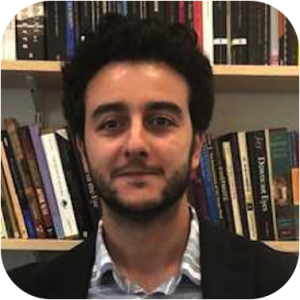
Tuesday May 19, 2020
Students in Tunisia, 1963-1979
Tuesday May 19, 2020
Tuesday May 19, 2020
Episode 94: Students in Tunisia, 1963-1979
In this podcast, Dr. Idriss Jebari discusses the student question’s emergence in the context of the Parisian radical sixties and the importance of Maoist insights. Jebari examines the way Perspectives seized on the “student question” in its journal in relation to the state’s reforms in the education sector and its discourse on youth faced with contestation. Jebari explores how the repressive events of 1968 and 1973 were highly revealing of Bourguiba’s thinking on Tunisian youth and how Perspectives countered it by promoting students to leadership positions. This podcast ends by depicting the atmosphere in the wing of the Tunisian prison where both generations were simultaneously held in the 1970s, as described in certain memoirs, as yet another reason to speak of many iterations of Tunisian leftism in the postcolonial era, and as an entry point to start compiling a growing archive to shed light on this occulted episode of the country’s history and work toward national reconciliation.
Dr. Jebari is Al Maktoum Assistant Professor in Middle East Studies at Trinity College Dublin. His work investigates the distinctiveness of the Maghribi critique of modernity in contemporary Arab intellectual and cultural history. He completed a doctorate on the history of the production of critical thought in Morocco and Tunisia at the University of Oxford on the intellectual projects of Moroccan thinker Abdallah Laroui and Tunisian thinker Hichem Djaït. He then held an ACSS postdoctoral fellowship at the American University of Beirut to study the dynamics of intellectual and cultural exchanges between the Maghrib and the Mashriq after 1967. He has published on the intellectual projects of several North African intellectual figures such as Abdelkebir Khatibi, Mohamed Abed al-Jabri and Malek Bennabi, and how the younger generations remember this intellectual heritage of the Arab Left. He is currently working on his first book manuscript that will address the critical societal debates that shaped North Africa’s path toward modernity in the sixties and seventies.
This podcast is part of the Contemporary Thought series and was recorded on July 22, 2019 at the Centre d'Études Maghrébines à Tunis (CEMAT).
Posted by Hayet Lansari, Librarian, Outreach Coordinator, Content Curator (CEMA).
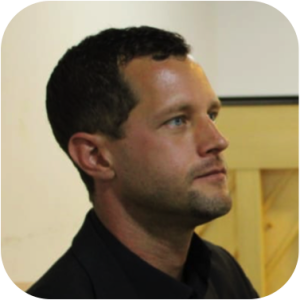
Saturday May 09, 2020
Saturday May 09, 2020
Episode 93: The Transmission and Effectivity of the Ma’luf Tradition, an Andalusian Music within Tunisia and Libya
In this podcast, Jared Holton discusses the transmission and effectivity of ma'luf, an Andalusian musical tradition of North Africa. Holton’s research project explores the historical and ethnographic circulations of Tunisian and Libyan ma'luf primarily through the tubu', which are recognized as stabilized structures of sound and identity. Jared has completed extensive fieldwork in Tripoli, Libya and Sfax, Tunisia. Other research interests include the connections between music, religion, and soundscapes; globalization and musical practices; and music pedagogy.
Jared Holton is a doctoral candidate and Chancellor's Fellow in Ethnomusicology with an interdisciplinary emphasis in Global Studies at the University of California in Santa Barbara (UCSB). He has undergraduate and graduate degrees in piano performance, intercultural studies, and music education, with over seven years experience teaching private and classroom-based music curricula. On the stage, his performances range from solo piano concerts, collaborative work in the Western Classical repertoire, and most recently as oud and vocal performer with the Middle East Ensemble at UCSB.
This interview was led by CEMAT Associate Director, Dr. Meriem Guetat, and was recorded on July 26, 2019, at the Centre d'Études Maghrébines à Tunis (CEMAT).
We thank Jared Holton for his ma'luf oud performance for the introduction and conclusion of this podcast.
Posted by Hayet Lansari, Librarian, Outreach Coordinator, Content Curator (CEMA).
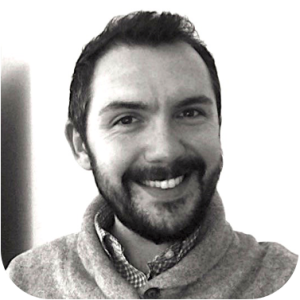
Wednesday Apr 29, 2020
The Buffalo Agency: Maghribi Ibadis in Cairo, 1850-1950
Wednesday Apr 29, 2020
Wednesday Apr 29, 2020
Episode 92: The Buffalo Agency: Maghribi Ibadis in Cairo, 1850-1950
In this interview, Paul Love discusses the early stages of his new book project on the history of Ibadi Muslims from the Maghrib who lived, worked, and studied in Ottoman Cairo. Tentatively titled The Buffalo Agency: Ibadi Muslims in Ottoman Cairo, the book follows the history of a trade agency, school, and library known as the ‘Buffalo Agency’ (Wikalat al-jamus), operated by Ibadis for nearly four centuries in the Tulun district of Cairo. From its founding in the 17th to century to its closure in the 20th, the Agency served as a waystation for students, scholars, and merchants on their journeys through Cairo. During that same period, it also became a school and library for Ibadi students and scholars connected to the famous al-Azhar mosque, some of whom stayed in Egypt for decades. By exploring the lives of Ibadi Muslims as they moved through the world of sharʿiah courts, made use of waqf to endow properties and books, and studied alongside and did business with their Sunni coreligionists, The Buffalo Agency shows the way in which Ibadis belonged fully to the Ottoman world. At the same time, the book shows how Ibadis in Cairo maintained connections with their coreligionists in North Africa, East Africa, and the Arabian Peninsula.
The interview focuses on the early chapters of the book, including those based on research in the Tunisian National Archives during summer 2019. Paul spent part of the summer on an AIMS grant, which allowed him time to examine the correspondence of one of the most prominent Ibadis of the Ottoman Empire: Saʿid b. Qasim al-Shammakhi, who served as both the director of the Buffalo Agency and the representative of the Tunisian Bey in Egypt during the mid-19th century.
Paul Love earned his PhD in Near Eastern Studies from the University of Michigan (2016). He is currently Assistant Professor of North African, Middle Eastern, and Islamic History at Al Akhawayn University in Ifrane, Morocco. His research focuses on the history of Ibadi Muslim communities in northern Africa, the Arabic manuscript traditions of the Maghrib, and colonial knowledge production in North Africa and the Sahara. His first book, Ibadi Muslims of North Africa (Cambridge University Press, 2018), traced the history of the formation of an Ibadi Muslim tradition in the Maghrib from the 11th-16th centuries. His recent publications have appeared in the Journal of African History, the Journal of Islamic Manuscripts, and Etudes et Documents Berbères.
This interview was led by CEMAT Director, Dr. Laryssa Chomiak, and was recorded on July 19, 2019, at the Centre d'Études Maghrébines à Tunis (CEMAT).
Posted by Hayet Lansari, Librarian, Outreach Coordinator, Content Curator (CEMA).
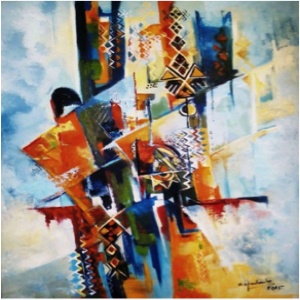
Wednesday Apr 22, 2020
L'anthropologie des pratiques langagières dans le contexte maghrébin
Wednesday Apr 22, 2020
Wednesday Apr 22, 2020
Episode 91: L’anthropologie des pratiques langagières dans le contexte maghrébin
L'anthropologie linguistique se donne pour objectif d’examiner, dans une perspective comparative, comment la langue façonne la vie sociale, la culture, l'identité et l'appartenance à un groupe social, et comment elle met en place des idéologies et des croyances culturelles dans la vie sociale. Langues, cultures et sociétés sont inextricablement liées. Les interroger suppose une approche interdisciplinaire mêlant anthropologie, linguistique, histoire, ethnographie, ethnologie, géographie sociale, sémiotique, analyse du discours et bien d’autres disciplines.
Se démarquant du structuralisme des années 1950-1960, l’anthropologie linguistique, l’ethnographie de la communication et plus tard l’ethnolinguistique et l’analyse du discours s’affirment comme courants émergents appréhendant la langue comme une pratique sociale. L’appareillage conceptuel de cette nouvelle approche du fait langagier s’articulant autour des travaux de Goffman, Hymes, Gumperz, Duranti, Clame-Griaule, Searle, Pêcheux, Austin, Malinowski et bien autres, a permis d’interroger autrement les rapports entre langues et sociétés.
L’approche anthropologique, surtout pour le cas du Maghreb, est porteuse de perspectives scientifiques prometteuses à plus d’un titre, invitant à reconsidérer les pratiques de recherche aussi bien théoriques qu’empiriques.
Pratiques discursives, humour et créativité dans les espaces numériques: Cas des tweets algériens

présenté par Dr. Kheira Yahiaoui, Maître de conférences à l’École Normale Supérieure d’Oran.
La présente contribution constitue une recherche linguistique portant sur les discours du réseau Twitter. A travers l’étude du hashtag, lieu de participation discursive, nous nous intéressons aux pratiques des twitteurs algériens. L’objectif est d’analyser d’une part, les pratiques langagières des internautes sur Twitter ; et voir d’autre part si ces pratiques dépendent de la nature, de la thématique et de la fonction du hashtag. L’analyse essaiera de répondre aux questions suivantes : Quel (s) genre (s) de pratiques discursives peuvent accompagner un hashtag ? La thématique du hashtag a-t-elle un impact sur la nature de ces pratiques ? Quelle fonction occupe le hashtag dans la pratique discursive sur Twitter ?
Notre recherche, de type qualitatif, interroge les pratiques langagières où nous nous intéressons plus particulièrement à l’analyse des stratégies discursives mises en place par l’auteur afin de se conformer à la thématique du hashtag, mais aussi à la définition de la fonction du hashtag à travers l’analyse des messages qui y sont associés.
l'intervention de Dr Kheira Yahiaoui débute à partir de 15:55.
Le conte populaire Amazigh en Tunisie.
Cas d’étude : le conte des sept filles et de l’ogresse

Présenté par Pr. Mansour Ghaki, Directeur de recherche à l’Institut National de Patrimoine en Tunisie.
Stumme, linguiste allemand a publié en 1900 à Leipzig 24 contes de Tamazret (sud -est de la Tunisie), parmi lesquels : le conte des 7 filles et de l'ogresse.C’est l’histoire d'un veuf, père de 7 filles, remarié et obligé par sa nouvelle femme à abandonner ses filles. La plus jeune se retrouve esclave chez une ogresse et son mari l'ogre.
l'intervention de Pr. Mansour Ghaki débute à partir de 36:22.
Rapport fragmenté de l’Homme à son espace. Etude sociolinguistique des lieux dits/vécus et perçus. Cas de la Casbah d’Alger.

Présenté par Dr. Réda Sebih, Maître de conférences à l’Université de Bouira.
Ma contribution à cette journée d’étude consacrée à « L’anthropologie linguistique de l’Afrique du nord » tentera de mettre l’accent sur le rapport des citadins à leur espace tel qu’il se dégage sous les outils d’étude de la sociolinguistique urbaine.
Ce qui a animé ma motivation est un discours qu’on pourrait qualifier de « dédoublé » tenu par les Casbadjis et qui semble être contradictoire. Ce discours fait partie d’un corpus récolté lors des enquêtes de terrain que j’ai menées à la Casbah d’Alger, il s’avère que son contenu est particulièrement intéressant car il véhicule un rapport à l’espace qui est en lui-même pluriel : il reflète un vécu complexe. Ainsi, une analyse de ce discours pourrait révéler la nature de ce rapport « multiple » et les « mises en mots » qui le caractérisent.
En vue de concrétiser cette recherche, ma démarche sera pluridisciplinaire (je ferai appel à la géographie et la psychologie sociales) à l’image de mon enquête de terrain qui est basée sur plusieurs techniques (le questionnaire, les entretiens, le parcours commenté et le récit de vie sur carte géographique).
l'intervention de Dr. Réda Sebih débute à partir de 01:01:55.
Les graffiti artistiques à Tizi-Ouzou : émergence d’un espace discursif

Présenté par Mr. Nacer Si Hamdi, Maître Assistant à l’Université d’Alger 2.
D’usage limité dans les pratiques linguistiques quotidiennes, l’alphabet tifinagh refait surface ces dernières années dans les espaces urbains de la ville de Tizi-Ouzou. Le tifinagh s’affiche donc sur les différents supports urbains et devient une marque et une particularité du graffiti artistique local. Une expression moderne et mobilisant essentiellement des jeunes appartenant à une culture urbaine universelle, répartis en microgroupes, se manifeste alors dans un système graphique ancien, voire antique.
Quelles sont les raisons et les contextes de cette référence aux caractères tifinagh ? Leur usage dans le graffiti artistique répond-il à des normes ou conventions ? Quelles sont les fonctions attribuées aux caractères tifinagh au niveau local ? Telles sont les questions auxquelles tentera de répondre notre communication.
l'intervention de Mr. Nacer Si Hamdi débute à partir de 01:19:04.
La BD muette algérienne : une autre façon de s'exprimer

Présenté par Pr. Saad Eddine Fatmi de l’École Normale Supérieure d’Oran.
D’une manière générale, la bande dessinée est un savant équilibre entre le texte et l’image. Parfois, le texte peut disparaitre laissant la part belle au dessin qui s’accapare de sa mission de communication en priorité. Notre objectif est d’aborder ce phénomène dans la BD algérienne des quarante dernières années. Nous nous interrogerons sur la place occupée par une BD dite muette.
Pour Groensteen, il n’existe aucun doute sur l’ancienneté de la B.D. muette : « La bande dessinée sans texte, entièrement silencieuse, existe depuis le XIXe siècle et connaît même une vogue particulière depuis quelques années. » Quant à Pomier, certaines formes de la B.D. peuvent se passer du texte à l’exemple du : « …strip, forme brève et qui permet donc d’être allusif… »
Les strips qui paraissaient dans les différents journaux algériens ne répondaient guère à cette vision puisque les textes ont, encore une fois, une présence accrue à l’intérieur des cases et où la lecture se fait obligatoirement de la première case jusqu’à la dernière. Des extraits seront présentés et analysés pour évaluer la portée graphique et aussi idéologique d’une BD alliant texte et image sans réelles instauration de codes réguliers.
l'intervention de Pr. Saad Eddine Fatmi débute à partir de 01:34:56.
Les pratiques langagières à l’épreuve des mobilités sociales
 Présenté par Dr. Karim Ouaras, Maître de conférences à l’Université d’Oran 2, chercheur associé au CRASC et Directeur adjoint du CEMA.
Présenté par Dr. Karim Ouaras, Maître de conférences à l’Université d’Oran 2, chercheur associé au CRASC et Directeur adjoint du CEMA.
Ma communication s’insère dans un vaste projet de recherche qui se propose d’interroger le fonctionnement des langues vernaculaires dans le contexte urbain en prenant en compte leurs dimensions synchroniques et diachroniques. L’accent est mis sur le cas de la langue kabyle dans la ville d’Oran et son évolution à travers l’espace et le temps sans avoir la prétention de le faire dans une perspective globalisante. L’intérêt est donc porté sur le cas précis du parler des Kabyles des Ath Abbès, localité située su Sud de la vallée de la Soummam, Béjaïa, installés à Oran à partir de la fin du 19ème siècle. Ce parler régional sera traité dans sa dimension historique ancienne et dans ses ramifications actuelles.
La migration des Ath Abbassiens intervient irréversiblement après l’insurrection d’El Mokrani en 1871, mais les populations de cette région d’Algérie étaient bel et bien préparées à ce grand départ, vu la famine qui prévalait dans cette contrée et l’intransigeance de l’administration coloniale au sujet de l’impôt de guerre. À cela s’ajoute le Décret Crémieux qui signa la volonté délibérée de la France coloniale de maintenir les Algériens dans un statut d’indigénat. Pour fuir cette atmosphère invivable et échapper à la déportation, les populations ne voyaient de salut que dans la migration qui les mènera indifféremment vers l’est et l’ouest du pays et vers les pays voisins et/ou les pays européens. Cette migration a pour corollaire une mobilité linguistique. Les deux ont généré des situations ethno-sociolinguistiques complexes par leurs composantes, leurs trajectoires et les enjeux actuels d’urbanisation et d’homogénéisation qui les guettent.
Les objectifs de cette recherche consistent à retracer l’évolution du parler d’Ath Abbès à Oran, évaluer ses usages actuels et analyser les représentations sociolinguistiques des Ath Abbassiens.
l'intervention de Dr. Karim Ouaras débute à partir de 01:49:46.
Ce podcast a été enregistré à l’occasion de la journée d’études « l’anthropologie des pratiques langagières dans le contexte maghrébin », qui a eu lieu le 5 mars 2019 au Centre d'Études Maghrébines en Algérie (CEMA) Cette journée a été organisée par l’équipe de recherche Pratiques langagières et religieuses au Maghreb, dirigée par Dr. Karim Ouaras Maître de conférences à l’Université d’Oran 2 et Directeur adjoint du CEMA, dans le cadre d’un programme de recherche en Sciences sociales soutenu par le CAORC et Carnegie Corporation of New York et réalisé par le CEMA et le CEMAT.
Cet episode s'inscrit dans le cadre du cycle de conférences « Langues et sociétés au Maghreb ».
Pour consulter les diaporamas associés à ce podcast, veuillez visiter notre site web: www.themaghribpodcast.com
Nous remercions notre ami Ignacio Villalón, étudiant en master à l'EHESS, pour sa prestation à la guitare pour l'introduction et la conclusion de ce podcast.
Réalisation et montage: Hayet Lansari, Bibliothécaire / Chargée de la diffusion des activités scientifiques (CEMA).

Wednesday Apr 08, 2020
Economic Policy in the Middle East and North Africa
Wednesday Apr 08, 2020
Wednesday Apr 08, 2020
Episode 90: Economic Policy in the Middle East and North Africa
In this podcast, Dr. Shana Marshall frames global discussions on populist trends in the Middle East and North Africa. Dr. Marshall argues that populism is an articulation of global capitalism that is marked by an anti-elite sentiment and a class-based ideology. She considers that the rise of populism is due to the difficulty of dismantling the bureaucratic and professional structures that keep the “ultra-rich” protected. Dr. Marshall explains that, by putting the burden on the poor to change their situation rather than slowing down the engine of accumulation, these structures recreate the conditions leading to populism.
Shana Marshall is Associate Director of the Institute for Middle East Studies and Assistant Research Faculty member at the George Washington University’s Elliott School of International Affairs. She earned her PhD in International Relations and Comparative Politics of the Middle East at the University of Maryland in 2012. Her dissertation, “The New Politics of Patronage: The Arms Trade and Clientelism in the Arab World” (forthcoming, Columbia University Press) examines how Middle East governments use arms sales agreements to channel financial resources and economic privileges to domestic pro-regime elites.
Her work has appeared in The Middle East Report (MERIP), The International Journal of Middle East Studies, Middle East Policy, Jadaliyya, and the Carnegie Middle East Center.
This podcast is part of the Contemporary Thought series and was recorded on November 5, 2019 at the Centre d'Études Maghrébines à Tunis (CEMAT).
Posted by Hayet Lansari, Librarian, Outreach Coordinator, Content Curator (CEMA).

Wednesday Apr 01, 2020
France's Shattered Empire: Fascism and Republicanism in Colonial Tunisia, 1931-1944
Wednesday Apr 01, 2020
Wednesday Apr 01, 2020
Episode 89: France's Shattered Empire:
Fascism and Republicanism in Colonial Tunisia, 1931-1944
In this podcast, Luke Sebastian Scalone, Ph.D. candidate in the Department of History at Northeastern University, discusses his research project on “France's Shattered Empire: Fascism and Republicanism in Colonial Tunisia, 1931-1944.”
In the midst of the ideological upheaval of the global 1930s, fascist movements developed in countries as wide ranging as France, Romania, Spain, and Sweden. However, European fascist movements did not limit their activities to Europe itself. Rather, they spread across colonial empires, establishing roots far from the centers of imperial metropoles. In this project, Luke Scalone examines the Fédération Tunisienne du Parti Populaire Français (PPF), an organization led by French settlers that could veritably be called “fascist,” in colonial Tunisia. Scalone argues that there were two mobilizing factors of the PPF in Tunisia: concerns about Italian fascist claims over Tunisia, and the rapid development of Habib Bourguiba’s Neo-Destour. These same concerns would, in 1940, push the colonial administration of Tunisia to rally to the pseudo-fascist Vichy France. Due to its opposition to Italian claims, the Fédération Tunisienne du PPF offers an interesting case study into two fascist movements who were combative against one another, suggesting that nationalism was a much stronger point of identification than shared fascist values.
This interview was led by CEMAT Associate Director, Dr. Meriem Guetat, and was recorded on July 16, 2019, at the Centre d'Études Maghrébines à Tunis (CEMAT).
Posted by Hayet Lansari, Librarian, Outreach Coordinator, Content Curator (CEMA).
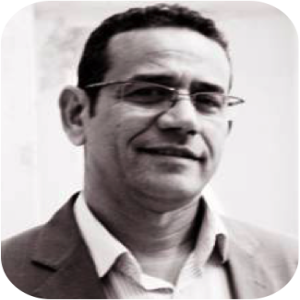
Monday Mar 30, 2020
Monday Mar 30, 2020
Episode 88: Rencontre autour de l’ouvrage :
La scientificité de l’empirisme en sociologie
Cet ouvrage collectif, qui réunit plusieurs auteurs, est le résultat des actes d’une journée d’étude qui s’est tenue le 18 octobre 2015 à l’université de Bejaïa consacrée à La méthodologie : conceptions et pratiques et au cours de laquelle l’on a eu à débattre des différentes pratiques de la méthodologie. Les textes présentés ici ont fait corps d’idées débattues, proposées et parfois opposées, mettant au jour la diversité des paradigmes que pose la problématique de la recherche dans tous ses états : épistémologique, théorique et empirique.
Les contributions des auteurs, au nombre de neuf, s’articulent en trois parties : la première traite de la problématisation de l’objet d’étude. La deuxième s’interroge sur l’expérimentation et la rationalité effective. La troisième se penche sur la pluralité des techniques et l’objectivité d’investigation.
Abdel-Halim Berretima est professeur de sociologie à l’Université de Bejaïa (Algérie) et membre associé de l’Institut interdisciplinaire sur les enjeux sociaux, sciences sociales, politiques et santé (L’IRIS), EHESS, Paris. Fondateur du master sociologie de la santé et du doctorat sociologie de la santé et du travail à la faculté des Sciences humaines et sociales (Université de Bejaïa), ses recherches portent sur la santé publique, la santé au travail, l’immigration et la ville.
Ont collaboré à ce volume: Abdel-Halim Berretima (Bejaïa), Jean-Yves Causer (Mulhouse), Gisèle Dambyant-Wargny (Paris), Gilles Ferréol (Besançon), Rachid Hamadouche (Alger), Smaïn Laacher (Strasbourg), Abdelkader Lakjaa (Oran), Madani Safar Zitoun (Alger), Tassadit Yacine (Paris).
Cette rencontre a été organisé par le Centre d'Études Maghrébines en Algérie (CEMA). Elle a eu lieu le 20 février 2020 au CEMA, Oran. Pr. Abdelkader Lakjaa, Sociologue à l'Université d'Oran 2 a modéré le débat.
Nous remercions Dr. Jonathan Glasser, anthropologue culturel au College of William & Mary, pour son istikhbar in sika à l'alto pour l'introduction et la conclusion de ce podcast.
Réalisation et montage: Hayet Lansari, Bibliothécaire / Chargée de la diffusion des activités scientifiques (CEMA).

Thursday Mar 05, 2020
Building Habitat: The Atelier des Bâtisseurs in North Africa and Beyond
Thursday Mar 05, 2020
Thursday Mar 05, 2020
Episode 87: Building Habitat: The Atelier des Bâtisseurs in North Africa and Beyond
In this podcast, Johanna Sluiter, PhD Candidate at the Institute of Fine Arts at New York University, discusses the building habitat: The Atelier des Bâtisseurs in North Africa and Beyond.
In 1949, the Atelier des Bâtisseurs (ATBAT) founded their first overseas bureau in Tangiers, Morocco. Having split with their mentor, Le Corbusier, and garnered worldwide attention for their first building site, the Unité d’Habitation in Marseille, ATBAT sought to expand its practice beyond France by establishing ATBAT-Afrique, before embarking upon future plans for ATBAT-Orient and ATBAT-Amérique, to be installed in Beirut and New York, respectively. This initial work abroad would therefore serve as both a critical test and potential catalyst for the young multinational, multidisciplinary firm. It would demonstrate the ability (or lack thereof) of European-trained architects to respond to contexts defined by radically new cultures, climates, and clients than they had previously addressed or even considered, and would articulate their idea of ‘habitat’ – a comprehensive framework for universal building – in visual form. This podcast addresses methodological approaches and challenges in researching ATBAT’s theoretical and concrete developments of habitat in Morocco before tracing the afterlives of these projects in adjacent Algeria, far-flung Cambodia, and ultimately returning to the Parisian suburbs at the end of the decade.
Johanna Sluiter is writing a dissertation on the Atelier des Bâtisseurs and the development of habitat in post-war architecture. She is currently an associate researcher at the École Normale Supérieure d’Architecture Belleville in Paris and a Chester Dale Fellow at the National Gallery of Art in Washington, D.C.
TALIM Director John Davison moderated the discussion for this podcast, which was recorded on 21 February 2020, at the Tangier American Legation and Institute for Moroccan Studies (TALIM), in Tangier, Morocco.
Posted by Hayet Lansari, Librarian, Outreach Coordinator, Content Curator (CEMA).
